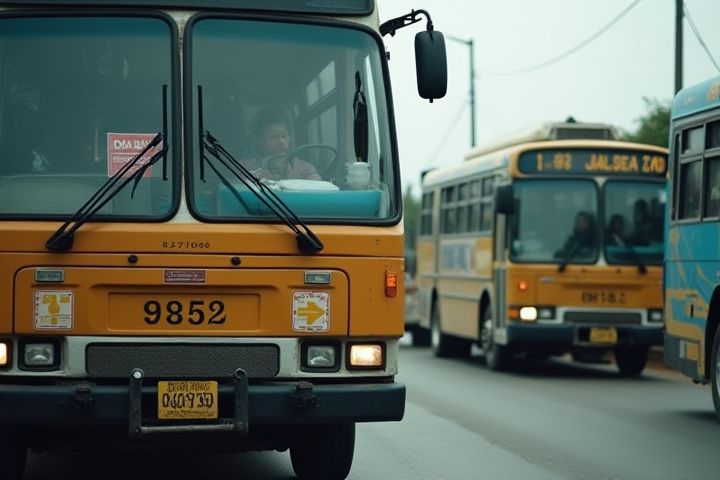
Public transport in Nigeria comprises a diverse range of options, including buses, taxis, and tricycles (locally known as "kekes"). The mass transit system, particularly in urban areas like Lagos and Abuja, plays a vital role in accommodating millions of commuters daily. Buses often operate on designated routes and can be either privately owned or government-run, with some offering air-conditioned services for added comfort. Ride-hailing services such as Uber and Bolt have gained popularity, providing modern alternatives to traditional taxi services. Safety and efficiency challenges persist in the public transport sector, highlighting the need for ongoing improvements in infrastructure and regulation.
Predominantly road-based
Public transport in Nigeria predominantly relies on road-based systems, primarily featuring buses, shared taxis, and motorbike taxis known as "okadas." These options cater to millions of commuters daily, offering affordable and accessible travel across urban and rural areas. Notable services include the Lagos Bus Rapid Transit (BRT) system, which improves transit speed and capacity, and the informal danfo buses, which are iconic to the Nigerian landscape. While there are emerging rail and water transport initiatives, road networks remain the backbone of Nigeria's transportation infrastructure.
Popular minibus system (Danfo)
In Nigeria, the popular minibus system known as Danfo plays a crucial role in urban public transport, especially in bustling cities like Lagos. Characterized by its yellow color, Danfo minibuses navigate through crowded streets, offering affordable fares that cater to a diverse demographic. Passengers benefit from flexibility as these minibuses operate on various routes, connecting neighborhoods with key commercial areas. Despite challenges such as traffic congestion and safety concerns, the Danfo system remains an integral part of daily commuting for millions of Nigerians.
BRT services in Lagos
Public transport in Nigeria, particularly in Lagos, heavily emphasizes Bus Rapid Transit (BRT) services, which are designed to provide efficient, reliable, and affordable transportation. The BRT system features dedicated bus lanes, reducing travel time and improving traffic flow for commuters. Key routes connect major urban centers, making it easier for residents to access workplaces and educational institutions. By using the BRT, you can avoid congestion and enjoy a more organized travel experience in the bustling city of Lagos.
Informal motorcycle taxis (Okada)
Public transport in Nigeria heavily relies on informal motorcycle taxis known as Okadas, which serve as a crucial means of mobility in congested urban areas. These motorcycles offer quick and flexible transportation, allowing riders to navigate through traffic-laden streets that traditional vehicles struggle to access. With affordability and availability being key factors, Okadas cater to a diverse demographic, facilitating daily commutes and emergency transport needs. However, safety concerns and regulatory challenges continue to shape the discourse surrounding their widespread use.
Rickshaws (Keke Napep)
Public transport in Nigeria prominently features Rickshaws, commonly known as Keke Napep, which serve as a vital mode of urban mobility. These three-wheeled vehicles are highly efficient for navigating congested streets, providing affordable transportation for millions of commuters. Keke Napep operates within various neighborhoods, offering flexibility and convenience that larger vehicles often lack. For your daily commute, these rickshaws not only help alleviate traffic congestion but also support local economies by providing job opportunities for drivers.
Rail services limited
In Nigeria, rail transport services are limited but have been gaining attention as part of the government's efforts to enhance public transport options. The Nigerian Railway Corporation operates key routes, connecting major cities such as Lagos, Port Harcourt, and Abuja, improving commuter access and reducing road congestion. Investments in modern rolling stock and infrastructure upgrades aim to boost efficiency and safety for passengers. You can experience affordable travel options while contributing to the growing demand for sustainable transport solutions in the country.
Interstate luxury buses
Interstate luxury buses in Nigeria offer a comfortable and efficient means of transportation across the country's vast regions. These buses are equipped with amenities such as air conditioning, reclining seats, and onboard entertainment, ensuring a pleasant travel experience. Major companies like ABC Transport, God Is Good Motors, and Young Shall Grow provide reliable services that connect key cities and towns. For your next journey, considering these luxury bus options can enhance your travel convenience while exploring Nigeria's diverse landscapes.
Traffic congestion issues
Public transport in Nigeria plays a crucial role in addressing traffic congestion issues, particularly in urban centers like Lagos and Abuja. Buses, taxis, and ride-sharing services provide essential mobility options, helping to reduce the number of private vehicles on the road. Investments in mass transit systems, such as the Bus Rapid Transit (BRT) in Lagos, aim to streamline transit routes and improve overall efficiency. By utilizing public transport, you can contribute to alleviating road congestion while promoting sustainable urban development.
Fuel scarcity impacts
Fuel scarcity in Nigeria significantly affects public transport systems, leading to increased fares and reduced service availability. Drivers often experience long queues at filling stations, causing delays that disrupt daily commuting for passengers. As transportation costs rise, many residents rely more on alternative routes or informal transport options, which can be less safe and regulated. Understanding how fuel scarcity impacts your travel choices can help you plan more effectively for a smoother commuting experience.
Mobile payment options
Public transport in Nigeria increasingly leverages mobile payment options to enhance the commuter experience and streamline transactions. Platforms such as Gokada and OPay facilitate cashless rides, allowing users to pay seamlessly via their smartphones. This shift not only improves efficiency but also promotes safety, reducing the need for cash handling in often crowded and informal settings. As mobile technology continues to penetrate the market, expect your commuting experience to become faster, more convenient, and increasingly secure.
